Stay in the know on all smart updates of your favorite topics.
Smart Data, Smart City: Data dilemmas #3: The International Edition
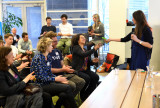
Amsterdam Smart City, Boston and Reykjavik would like to explore with you which decisions are needed for responsible use of data.
The possibilities of data and new technologies for urban challenges are endless. We use data to make cities safer, cleaner and, for example, more accessible. But what happens to all data that is collected? Who may collect them? Which dilemmas do we encounter when we collect (personal) data to improve the city? Which choices did people make and why? Which considerations play a role?
These questions are important for everyone; for governments, residents and companies. Amsterdam Smart City would like to explore with you which decisions are needed for responsible use of data.
In part 1 we discussed the opportunities of Tada: a manifesto for the responsible use of data and a 3D model for Amsterdam. In part 2 we discussed the role of bottom-up initiatives in measuring data. The third edition will be an international exchange!
Amsterdam, Reykjavik and Boston will share some of their most important projects currently going
on. They will share the data choices they came across and tell you which decisions they made.
Date: 2nd of December 2019
Location: Datalab, Weesperstraat 113, Amsterdam
Program:
15.45: Walk-in
16.00 – 16.05: Introduction by Leonie van den Beuken, program director Amsterdam Smart City
16.05 – 16.20: Smart City Hilversum platform by Atos + discussion
16.20 – 16.35: Questioning the ethics of technology implementations by Jaclyn Youngblood, Mayor’s Office, City of Boston + discussion
16.35 – 16.50: Bike data commons by Sander van der Waal, Waag + discussion
16.50 – 17.05: An integrated data warehouse and challenges/dilemmas by Óli Páll Geirsson, Chief Data Officer, City of Reykjavik + discussion
17.05 – 17.20: Plenary discussion and wrap-up
17.20 – 18.15: Drinks & laughter
Photo: Hans Kleijn
Bestel het boek ‘Een slimme stad, zo doe je dat’
Dit jaar onderzoekt de Future City Foundation met 26 partners hoe we de smart city moeten ontwerpen. We denken dat de stedenbouw en de producten die daaruit voortkomen radicaal veranderen. Net zoals dat gebeurde met andere bedrijfstakken. We willen begrijpen hoe dat gebeurt, welke kansen dat oplevert en welke risico’s er aan kleven.
De resultaten van het project presenteren we in een boek – genaamd ‘Een slimme stad, zo doe je dat – Verbonden, flexibel en betekenisvol; maak de echte future city’. U kunt het boek (met ruim 200 pagina’s) aanvragen via het aanvraagformulier. Digitaal lezen is gratis, voor een gedrukte versie vragen we €29,-.
Bestel het boek via https://future-city.nl/bestel-het-boek-een-slimme-stad-zo-doe-je-dat/
Democratizing Technology
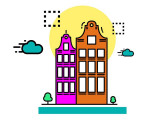
How can individuals regain control of their personal data? And how can we align the digital world with public values that we foster in our society? This event showcases the valuable work that has been done by DECODE in both Amsterdam and Barcelona; and other initiatives that are fighting to reclaiming the digital space for public good, with a specific focus on Public Spaces. The speakers will share practical solutions for responsible data management, applications and lessons learned.
Speakers:
Evgeny Morozov (writer & publicist)
Marleen Stikker (founder & director Waag)
Francesca Bria (founder & director DECODE)
Nina Boelsums (Dyne & starter of referendum on privacy law NL)
Aik van Eemeren (CTO office Municipality Amsterdam)
Masterclass (5 nov): leer de nieuwe ontwerpprincipes van de slimme stad

Hoe ontwerpen we de smart city? Dat heeft Future City Foundation samen met 26 partners afgelopen jaar onderzocht in het Smart Stedenbouw-project. Op dinsdag 5 november organiseren we een – gratis – masterclass waarin we de nieuwe ontwerpprincipes voor de future city met u delen: verbonden, flexibel en betekenisvol. Meld u gratis aan!
In 4 stappen doorlopen we de principes die het ontwerp van de stad gaan veranderen en natuurlijk om zelf aan de slag te gaan met het ontwerpen van de future city. En we brengen graag samen met u een toast uit op het eindresultaat van ons Smart Stedenbouw-project – ons boek ‘Een slimme stad, zo doe je dat – Verbonden, flexibel en betekenisvol: maak de echte future city’- en de nieuwe projecten die daaruit gaan voortkomen. Wees welkom om met ons mee te toasten!
Kijk voor meer informatie en aanmelden op https://future-city.nl/masterclass-5-nov/
Operating System for a City

Have you ever thought about your city as a computer, and about institutions and administration as an OS operating system for it? This metaphor is becoming more and more relevant to reality. Telephones are turning into smartphones and cities into smart cities.
The new system for cities is being downloaded ...
Read full article: http://smartcitiespolska.org/en/new-operating-system-for-smart-cities/
According to statistics, you use a smartphone to read this page. Do you know what is the most important and most valuable component of it besides the camera? Of course its operating system. This single element can increase the power and safety of the device.
If it works inefficiently, you risk losing data, slowing down performance, and quickly draining of the battery. Current city's operating systems have many disadvantages. We know this feeling of system malfunction well.
If operating system performs its function in the background, we can experience games and multimedia on the screen and use our software necessary for a business. The same rule applies to cities and it's "operating systems".
Read more:
https://www.linkedin.com/pulse/operating-system-city-mateusz-jarosiewicz/
Workshop Machine Learning for Research
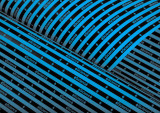
Are you a researcher and do you have a challenging research question that might benefit from machine learning, deep learning or AI? And do you have the data to start working on this question? If so, this workshop is for you.
Tell us about your idea and your team (3-5 people). From all submitted ideas we will invite up to five teams to spend a week of hands-on work with two machine learning experts. Together, we will explore your data in order to find the best machine learning strategy with which to tackle your scientific question. The workshop will be a collaborative effort in which we will share knowledge, develop and explore new ideas and boost your understanding of current machine learning techniques.
At least two team members should be based at a Dutch university or research institute that is affiliated with NWO, KNAW, universities for applied sciences (“hogescholen”), or TO2. Proposals can come from any scientific domain. The workshop will be free of charge (1-week workshop including lunch, but no travel expenses or accommodation costs).
Requirements:
A team
This workshop is a collaborative effort and we ask for submissions from teams of between 3 and 5 people. Your fellow members should all share a strong interest in the proposed research question, but may be as diverse as you like and can range from students to professors and include different disciplines, faculties, levels of expertise, etc. We strongly encourage submissions from teams comprising a diverse mix of researchers from different universities or institutes.
Data
To get the most out of this one-week workshop, the data you want to work with must be available for use during the workshop. Before accepting a proposal, we may ask you to let us briefly inspect the data in order to make sure it is ready to be used for hands-on work during the workshop. If you are unsure whether your data is suitable, please don’t hesitate to contact us before applying.
Basic programming skills
We do not expect expert-level programming skills or prior experience with machine learning, as long as you are keen to learn new things. However, at least some team members should have basic programming experience so that we can focus on actual hands-on work during the workshop. Since we will work in very small teams, we can easily adapt to your level of expertise.
If you’re still worried you might not have the right computational skills, please feel free to contact us.
How to apply?
To apply, please visit: https://www.esciencecenter.nl//workshop-machine-learning-for-research
Floriade - 5g Field lab inspiration day

On the 17th of October in Almere, we welcome you to join us in our search for innovation and the impact of 5G on topics related to the Floriade: smart mobility, IoT/Smart City, Smart Farming, Drone delivery and 5G design. In a public-private partnership (Almere, Floriade and BTG), we have created a program which is designed around sharing the I-street strategy of the Floriade, sharing the 'digital city' strategy of Almere, learning of best practices of Amsterdam Smart City and taking a deep dive into the challenges of the Floriade.
So....be inspired, be engaged and standby to share your knowledge with your peers! We are hoping to attract entrepreneurs, IT suppliers, government officials and more.....
We hope to see you there! Team Almere, Floriade and BTG!
Denk mee: Opzet NL programma Digitalisering Openbare Ruimte
Op 24 september is er een werksessie, tijdens de Common Ground week van VNG, waarin onderzocht wordt welk bovenstedelijk programma nodig is om de 'slimme stad' pilots en projecten op te schalen, naar grote icoonprojecten voor Nederland.
De openbare ruimte wordt steeds verder gedigitaliseerd. Sensornetwerken slinger zich door de stad, we willen schonere lucht, betere doorstroming van het verkeer, bestand tegen hoosbuien en hitte. Er komen ook grote veranderingen aan die de stad letterlijk op de schop nemen: de grond moet open voor gasbuizen, stroomvoorziening, riolen, glasvezel. Werkelijk unieke kansen om de stad te digitaliseren.
Denk en doe mee tijdens dit PI event.
Locatie: Catharijnesingel 55 Utrecht, op loopafstand van CS Utrecht
Dag en tijd: 24 september van 9:00-14:00 (inclusief lunch)
Aanmelden: via email naar h.nouwens@connectedworlds.nl
National eScience Symposium 2019
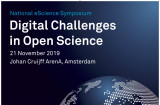
The Netherlands eScience Center will host its 6th annual National eScience Symposium on 21 November 2019 at the Johan Cruijff ArenA, Amsterdam. The theme of this year’s edition is ‘Digital Challenges in Open Science’ and will focus on the ways that innovative digital technologies can be used to advance Open Science. The Dutch National eScience Symposium is a one-day event where academic researchers, industry representatives and policy-makers from various disciplines come together to discuss and share views on the latest developments in eScience.
The symposium will feature thematic sessions showcasing world-class research and digital developments around Open Science. Topics include digital challenges in open science, the role of open science in space and earth research, and the European Open Science Cloud. In addition, the symposium will showcase several demos of cutting-edge research software developed by the eScience Center and her partners, as well as the announcement of the Young eScientist Award 2019.
KPN 5G Consumer Challenge
Will you join us in the 5G Challenge?
The future mobile 5G network is more than a faster version of the usual 3G and 4G wireless technologies. In addition to improved bandwidth, 5G has a lower latency (the delay in communication between devices), better security options and more powerful antenna concepts and a much higher capacity. Where 4G connected for people, 5G will connect society.
Will you join us in the challenge?
You are a start-up with the skills to connect society. We - the Johan Cruijff Arena, City of Amsterdam, Capgemini/Sogeti and KPN - challenge you to design and pitch a compelling service/application for consumers using 5G capabilities.
For more information and to sign up for the challange visit:
https://www.eventbrite.nl/e/tickets-kpn-5g-consumer-challenge-66995747083
Smart cities are decades away: but open cities are within reach
At the ODI we are working on a project on Open Cities. We have just published a blog about why thinking about open cities, rather than smart cities, can lead to a better future. Interest to see what you all think.
The Big AI and Data Science Graduation Fair
In January 2019 the City of Amsterdam joined forces with 22 AI and Data Science students to work together on improving the livability of our city. These students, coming from the University of Amsterdam, the University of Utrecht and the University of Delft, are doing their master thesis researches at the municipality.
They are working on projects related to reducing poverty and discrimination, battling housing fraud and parking problems, making our city cleaner, decreasing costs and optimizing administrative processes for all citizens.
After months of research, they are now on the final stretch!
Before they submit their theses at the end of June, we would first like to celebrate this moment with a thesis fair at Datalab on the 27th of June.
During this event, the students will present their findings and share their insights with the people of Amsterdam. In a poster session setup, everyone would be able to explore the different projects, enjoy short demonstrations and learn all there is to know about their favorite topics.
You are warmly welcomed to ask them difficult questions, share your improvement ideas or simply get inspired by their work.
But most of all - this would be the moment to show them our support and celebrate their achievements together.
Recap of the event ‘Data dilemma’s #2 Sensing the city’
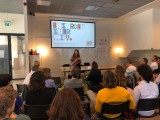
On the 6th of June, some people of the Amsterdam Smart City community came together in Datalab to discuss dilemma’s around sensing the city. What are issues around this theme? Who should do this? How can we involve citizens? What are the learnings up until now?
Leonie van den Beuken opens the afternoon and states that we should not only keep talking and keep figuring and losing time. Because time is what we don’t have. If you're aiming for a better world, you have to act now. ‘So today’, she says, ‘we have people who are acting upon our dilemma’s. And if we are truly able and willing to learn from each other, we can accelerate.’
Judith Veenkamp – Waag
Judith from Waag kicks off by telling about the Smart Citizens Lab. A research lab with a leading role for citizens and aims to facilitate them in measuring their own living environment, so called ‘public research’. Within the Smart Citizens Lab Waag developed a framework for citizen sensing: how to enable citizens in doing their own measurements. Not only are they in charge of sensing strategy for the sensors that will be deployed in the city, the data collected will also be analysed and interpreted together with citizens. Collecting the data together with citizens and other stakeholders, like municipalities, helps to create a shared reality.
For their project Hollandse Luchten, an air quality sensor was developed in their lab. The basic version measures Particular Matter (PM), temperature, humidity and air pressure. The extended version also measures NO2 and O3. They will deploy 200 sensors in 3 pilot communities; IJmond region, Zaanstad en Buiksloterham. The sensor is a modular system and citizens assemble the sensor themselves. The aim goes beyond just measuring, it is to have societal impact by increasing awareness. It is not an alternative for professional measurements but they can enrich the official air quality measurements and empower citizens.
A nice example of how tech can help build a sustainable city. Technology as a mean. Not just talking about it but also making and experimenting.
Ron van der Lans – City of Amsterdam about Air View
The City of Amsterdam recently announced that for the coming year, Google will measure air quality in the city. Ron van der Lans tells us more about this: ‘Air View is mobile measuring of air quality with Google Street View cars. The goal is to have a detailed year overview of air quality in various parts of Amsterdam. We will get insights in the flow of the air quality per street in Amsterdam. In the end it will be open data, but not during the process.’
Ron also takes us through the process of this project, in which the University of Utrecht is also participating, and shows what it went through before actually implementing. Different questions pop up from the audience. Some more practical; if it is only 1 point in time on every location, does it add value? There are already different measurement systems in place in Amsterdam: GGD , RIVM. What does this add?
Ron explains that it measures on street level, which is new. It will also measure more and it will contribute to create a global view. This also triggers more principled questions: if these are open data, how will it affect the housing market? Why does Google want to do this? Is this not a responsibility of the government? What aspects of political decision making were considered? What can and what will we do with the results?
Tom van Arman – CITIXL
Tom van Arman from CITIXL has an inspiring and triggering talk. Tom starts with warning us how data can affect us with some alerting examples. The large scale data collection in 1934 for the greater benefit of all but later misused by the Nazi regime. He also mentions the Chinese Social Credit Card Score; a system that is meant to rate each citizen’s trustworthiness. And last he shows us Quayside Toronto. A wonderful new future city, built by Google.
Will this really make our lives better or is it just for commercial benefits? How do we bridge the gap between policies and the public? How can we design tests with the public to create a shared reality and common understanding?
He ends with showing us his camera experiment of last year during WeMakeThe.City. The experiment featured a marked area telling you the area would recognize your face. All basis questions came up and this was a good discussion starter. This year CITIXL will start measuring all sorts of things on the Marineterrein; how many sunbathers, how many swimmers, a drowning alert, etc. Again a lot of ethical questions will be raised and dealt with. But if we can ‘t measure it, how can we improve it?
Roel van de Loo - SPPS
Roel has a lot of experience in measuring in the city, e.g. with eNoses in the Port of Amsterdam and starts with warning us that he will make us depressed: ‘Technology is not perfect and limited. Technology is still complicated for non-experts. Cheap sensors can be useful but they do not always tell the truth. They face difficulties for example with calibration and interferences. So be careful: it is not easy to measure. You have to know what a sensor does and what it does not.’
Roel shares some crucial lessons learned:
• Cooperation between governments, companies, foundations and citizens is essential but not easy.
• Make a detailed agreement. Once you share data between government and company, what is going to happen?
• Create a library and share learnings
Roel tells us there is a fundamental distrust of (government) calculations. Citizens only want to know what is wrong and they do not want to pay for it. Starting is easy but ending is hard.
------
After the presentations, an interesting discussion started. Some people feel comfortable Google will measure air quality: it’s already happening, so what is the fuzz about now? Others say: Air quality is a fundamental task of the government, so the measurement is the responsibility of the government. If the government starts measuring less because of the collaboration with businesses, will it minimize the measurement capacity? When a business has a different agenda, we have lost measurement capacity.
Leonie asks: What would be ok for you to be measured? Also here different opinions. Collecting data is necessary to make informed decisions and to take emotions out of the discussion. But teach people on how to do that. These data can bring us a lot of positive uses. But how do we use it for good? It’s a fine line between surveillance and service.
Someone else states that data collection is enforced and it takes away freedom of autonomous decision making. Again enough data dilemma’s to discuss. In the audience, Paul Manwaring closes stating we are all part of the city – we have to explore data opportunities, while respecting each other’s rights and be transparent, we’ve got to try!
Pitch your sensing initiative in Datalab this Thursday!
In the last couple of years, there were plenty of inspiring local initiatives measuring and sensing issues, such as air quality, water quality and amounts of people. What were the results of these experiments and projects?
On the 6th of June, Amsterdam Smart City hosts 'Data Dilemma's: Sensing the City' in Datalab. Several bottom-up initiatives will present themselves, share the data they collected and tell you about the challenges they encountered. https://www.eventbrite.com/e/smart-data-smart-city-data-dilemmas-2-sensing-the-city-tickets-61992657708
And you can be part of the program!
Do you have an initiative that can measure air quality, water quality, smell or something else? Let us know and you might get this last-minute chance to pitch on stage!
Drop a line below or send an e-mail to Nancy, via nancy@amsterdamsmartcity.com.
Wanted: pitches of smart city solutions for digital twins
Do you have a smart city solution for digital twins? Pitch your product or service on 5 September 2019 in Antwerp (Belgium)!
On 5 September 2019 Economic Board Utrecht (EBU) and Future City Foundation organise the Networking excursion Digital Twin to Antwerp (Belgium) for administrators with delegation leader Klaas Verschuure (alderman for the Municipality of Utrecht). We want to learn about the possibilities of a digital twin for municipalities and provinces.
To bring supply and demand together and share knowledge, we offer tech companies and data experts the opportunity to pitch their smart city solution for an audience of 40 administrators and the top of municipalities and provinces from the Netherlands. Interested parties can register their pitch until 10 July 2019.
What kind of pitches are we looking for?
- Smart city solutions for that municipalities or provinces face (physical, social and economic)
- Successful smart city projects or experiences from local governments which are interesting for other municipalities or provinces.
- Innovative smart city business ideas from smart entrepreneurs, app builders or other techs.
There is room for 15 pitches, participation is without charge and possible until 10 July 2019. Pitches can be given in Dutch or English.
Interested? Check our website for more information and to register: https://future-city.nl/pitches-antwerp-eng/
Pitch carrousel Digital Twin

Wanted: pitches of smart city solutions for digital twins
On 5 September 2019 Economic Board Utrecht (EBU) and Future City Foundation organise the Networking excursion Digital Twin to Antwerp (Belgium) for administrators with delegation leader Klaas Verschuure (alderman for the Municipality of Utrecht). We want to learn about the possibilities of a digital twin for municipalities and provinces.
To bring supply and demand together and share knowledge, we offer tech companies and data experts the opportunity to pitch their smart city solution for an audience of 40 administrators and the top of municipalities and provinces from the Netherlands. Interested parties can register their pitch until 10 July 2019.
When & where
Thursday 5 September 2019
In Antwerp (Belgium), exact location t.b.a.
12.00 – 17.30 hr (lunch and drinks included), pitches 14.00 – 15.30 hr
What kind of pitches are we looking for?
- Smart city solutions for that municipalities or provinces face (physical, social and economic)
- Successful smart city projects or experiences from local governments which are interesting for other municipalities or provinces.
- Innovative smart city business ideas from smart entrepreneurs, app builders or other techs.
What we offer
- 4 minutes in the spotlight
- Meet & Greet: before and after the pitch, pitchers get their own stand in the reception area (where the lunch and drink takes places)
- A direct reach of 40 administrators and senior civil servants of municipalities and provinces from the Netherlands and Flander, who are interested in digital twins.
- Participation in the pitches is without charge
- Travel and accommodation costs are for your own account. Lunch and drinks during the program are included.
Check for more information our website: https://future-city.nl/pitches-antwerp-eng/
------------------------------------------------------------------------------------------------------------------------
Op 5 september organiseren Economic Board Utrecht (EBU) en Future City Foundation de Netwerkexcursie Digital Twin naar Antwerpen voor bestuurders, met delegatieleider Klaas Verschuure (wethouder Gemeente Utrecht). We willen daar leren over de mogelijkheden van een digital twin voor gemeentes en provincies.
Om vraag en aanbod bij elkaar te brengen en kennis te delen, bieden we techbedrijven en datadeskundigen de kans om tijdens de Netwerkexcursie Digital Twin op 5 september in Antwerpen hun smart city oplossing te pitchen voor een publiek van 40 bestuurders en de ambtelijke top van gemeenten en provincies uit Nederland. Zo komen we samen verder. Geïnteresseerden kun tot 10 juli 2019 hun pitch aanmelden.
Waar & wanneer
Donderdag 5 september 2019
In Antwerpen, exacte locatie volgt
12.00 – 17.30 uur (inclusief lunch en borrel), pitch carrousel 14.00 – 15.30 uur
Wat voor pitches zoeken we?
- Concrete smart city oplossingen voor de uitdagingen waar gemeenten of provincies tegenaan lopen (fysiek, sociaal en economisch)
- Succesvolle smart city projecten of ervaringen van lokale overheden die ook interessant zijn voor andere gemeenten of provincies.
- Innovatieve smart city businessideeën van slimme ondernemers, appbouwers of andere technerds.
Wat bieden we?
- 4 minuten in de spotlight
- Meet&Greet: voor en na de pitch krijgen pitchers hun eigen stand in de ontvangstzaal (waar de lunch en borrel is)
- Livestream via ons Youtube-kanaal (en die laten we gewoon staan)
- Een direct bereik van 40 bestuurders en de ambtelijke top van gemeenten en provincies uit Nederland die interesse hebben in digital twins.
- Deelname aan de pitchcarrousel is gratis.
- Reis- en eventuele verblijfskosten zijn voor eigen rekening.
Kijk voor alle informatie en aanmelden op: https://future-city.nl/pitches-antwerpen/
Data Dilemmas #2: Sensing the City
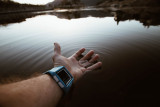
This week the City of Amsterdam announced that for the upcoming year, Google will measure the air quality in the city.
In the last couple of years, there were plenty of inspiring local initiatives measuring and sensing issues, such as air quality, water quality and amounts of people.
What were the results of these experiments and projects?
On the 6th of June, several initiatives will present themselves, share the data they collected and tell you about the challenges they encountered.
Did these examples have an influence on governmental policy?
Speakers:
Leonie van den Beuken - Director Amsterdam Smart City
Introduction
Ron van der Lans - City of Amsterdam
Judith Veenkamp - Waag
Air quality in the Smart Citizens Lab, Smart Citizen Kit and demo of sensor of project Hollandse Luchten
Tom van Arman - CITIXL
Upcoming camera vision experiment using UMBO to keep the Marineterrein safe and secure for it occupants and visitors.
Roel van de Loo - SPPS
Sensing in the Port of Amsterdam and reflexions
Would you like to present the results of your measurements?
Send an e-mail to nancy@amsterdamsmartcity.com.
Debate Smart Cities or Dumb Cities
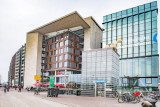
Toronto seems to become a testing ground for the urban development of smart cities. Sidewalk Labs, part of Google’s parent company Alphabet, will redevelop the city’s waterfront. Data will be used to design smarter, more sustainable designs, to handle waste better or to reduce our energy consumption. But with Google at the helm, data is also the capital of this city district: and what does that lead to? It is time to start the discussion with architects.
During the Architecture Residency of Do Janne Vermeulen we will organise a debate about smart cities on Tuesday 21 May. We discuss the developments of data in Amsterdam, look at the developments in Toronto and talk about the position of the architect. Through this debate we hope to feed the discussion from a design perspective.
What’s the question?
Architect in Residence Do Janne Vermeulen, architect and co-founder of Team V, visited Canada and is bringing the debate to the Netherlands. While reading, watching, writing and talking about smart cities, it is tempting to think in terms of technology instead of the city. Rather than “What do we want and how does smart technology offer a solution for that?” it is about “What possibilities does smart technology offer and what can we achieve with it?”
Privacy issues make the conversation even more difficult and sometimes make us long for the ‘stupid city’. But our spatial domain and the digital world are becoming more and more interconnected. Can we grow, densify and become more sustainable without smart systems? Is technology indeed the answer to our questions? What is exactly the problem with ‘stupid cities’? What are the benefits if we focus on digital technologies, analyse large amounts of data and provide the city with systems and IoT (Internet of Things) sensors? And what other means do we have? In short, a lot of questions to which smart technology might be the right answer. And maybe not.
Programme and speakers
Do Janne Vermeulen – Team V – Co-founder and architect
Meat Do Janne Vermuelen as our second Architect in Residence. She gives a short pitch about the role of big data in her field of expertise.
Marleen Stikker – Waag Society – Founder
Marleen Stikker supervises the digitisation of society with research and all kinds of initiatives from Waag Society. This evening she will share her views on the developments concerning Big Data. She also offers perspective on the role of the architect within smart cities.
Ger Baron – City of Amsterdam – Chief Technology Officer (CTO)
Ger Baron, the first CTO of Amsterdam, brings us up to speed on technological innovation and the digital transformation of Amsterdam.
Emil Zelic – Waterfront Toronto – Executive Director Project Management Office & IT
As an IT professional, Emil Zelic, who will fly in from Toronto, tells about where application and disruption of smart technologies meets design practices. He reflects on the progress and philosophises about the Smart City applicability in Amsterdam.
The lectures are followed by a debate between the audience and the speakers.
Smart Cities or Dumb Cities
Architect in Residence Debate: Do Janne Vermeulen, Team V
Date: Tuesday 21 May 2019
Time: Starts at 8PM / Door open at 7.45PM
Location: OBA Oosterdok, auditorium, Oosterdokskade 143
Language: ENGLISH
Tickets: € 12,50
Online tickets available at our ticket page
Help build an open data market and win 750,000 euro
Enter the competition and win up to 750,000 euro in co-financing for your idea for an open, trusted and fair market for data sharing. A market that is scalable and broadly applicable and that allows parties in the Amsterdam area to work on a smart, green and healthy region.
Are you an organization that is familiar with digital technology and do you know how to use your knowledge for a smart, green and healthy region? Register for this competition!
Bedrijfsleven roept op tot samenwerking Smart City ontwikkeling
Veel pilots, veel projecten, veel aandacht, veel events maar ... waar blijft de brede toepassing? Hoe kunnen we de pilots opschalen, successen in andere steden toepassen?
Wat volgens het bedrijfsleven zal helpen, is een centrale regie gevoerd door overheid en bedrijfsleven.
Bekijk hier de video met de oproep.
Of ga naar de website https://nlsmartcities.com voor meer informatie en meer video's.
Stay up to date
Get notified about new updates, opportunities or events that match your interests.

